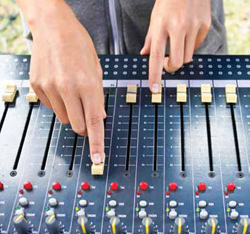Several years ago, I had the pleasure of mixing a few times for a very talented rock band.
The first show was a CD release party at a local all-ages club, and I got a call about an hour before the band was to take the stage.
On the other end of the phone was the band’s bass player (an old friend), who asked me to come down and mix. They were the second band that night and had no confidence in the mix engineer after hearing the first band. We sealed the deal with food, a T-shirt and a CD.
When I arrived 20 minutes later, the first band was still on stage, and it was immediately apparent why they called me. In addition to several “issues” on the console side of things, there were improperly set gates on kick and snare that were doing nothing more than cutting off the attacks.
Yet my first reaction was compassion for the engineer, because I’d been in similar situations in the past where I had absolutely no comprehension that whatever I was trying to do was actually doing more harm than good. We can often get fixated on one idea and completely fail to hear the damage we’re leaving in our wake.
When it was time for my guys to go on, there was only time for a quick setup. I pulled down the gains, opened up the faders, ditched the gates, and then jumped on stage to set the microphones.
After a two-minute check, the band hit the ground running. It was a great show, but certainly not on my account – all I did was make sure the system didn’t get in the way, and the musicians did the rest.
Some of us have been fortunate enough to apprentice under a great engineer and receive plenty of input on how to do things better. But for every person who benefits from such a relationship, there are many more who don’t.
Fortunately, there’s a simple tool that can help. I’m talking about recording the live mix for later evaluation. Too often, those who try it quickly abandon the idea because they don’t like what they hear, and it’s easier to blame the recording by saying it doesn’t sound like it does in the room rather than accept that what they’re hearing live is tainted by what they think.
I record my live mix at every opportunity so that I can listen to it later for insight about myself and what I thought I was hearing during the gig. So far, I’ve come away from this process with two revelations.
First, it’s critical to not over-think things. I believe this to be the bane of most technically oriented people. There comes a point where the specifications become more of a distraction rather than helping.
Second, being able to evaluate a mix and determining what needs to be cut in level is a greater expertise than boosting levels for certain mix elements that can’t be heard.
Should we expect to hear a ready-to-release recorded mix? Of course not. But we should be able to hear the foundation, pad, rhythm, lead and fill, all more or less in their correct relationships.
My recording process varies. If it’s a standing gig, I use whatever is at hand – cassette, DAT, CD-R, or straight into a Mac/PC audio input. For portability, I had an AIWA HD-S1 DAT recorder that
went with me to every gig, and when it died, I replaced it with an Edirol R-09 flash recorder (which fits beautifully in a cast-off Audix drum mic carry case).
When I have more time and want top quality, I bring a rack case with my Alesis HD24 multitrack recorder and Apogee PSX-100 converter for patching to a pair of the main out jacks on the console.
Are these mixes perfect? No. But we have to keep things in perspective. A good live mix will have all of the elements in place, and these should be there to be heard on the recording.
Great sound can be relatively easy to achieve. The solution is in removing the ideas we think up that get in the way.
Since his start more than 30 years ago on a Shure Vocalmaster system, James Cadwallader remains in love with live sound. Based in the western U.S., he’s held a wide range of professional audio positions, performing mixing, recording, and technician duties.















